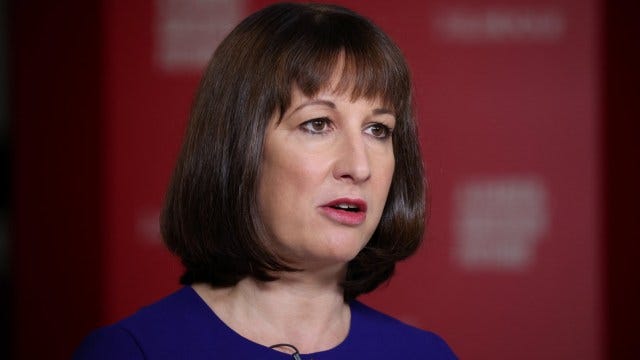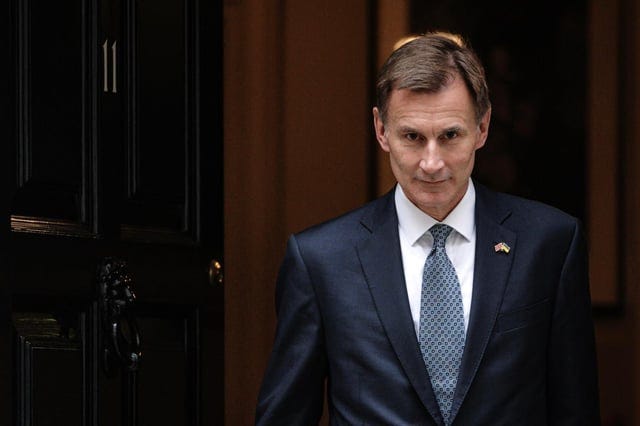The State of Things
Laying blame and winning time
It is not known if Jeremy Hunt left a note in the Treasury for Rachel Reeves. If he did it might have said “there is less than no money left. In fact, there is a good deal less than we said there was”. That, at least, was the Chancellor of the Exchequer’s version of the state of the public finances in her statement to the House of Commons yesterday. There is, she says, almost £22 billion needed that is simply not there. This shortfall will be used to justify the tax increases that, throughout the election campaign, both parties pretended would not be necessary.
Reeves opened by saying that “In this statement, I will do three things”. In truth she really wanted to do one. She went on, as promised, “to expose the scale – and the seriousness – of what has been uncovered”, to “lay out the immediate action we are taking to deal with the inheritance” and to “set out our longer-term plans to fix the foundations of our economy”. But, really, this speech was all about the first objective. The best ally for any government is the government that has just gone before and the target in the Chancellor’s sights was the Conservative party. It is standard practice to win as much time as possible, and as much capacity for nasty decisions, from the mess left behind by the last lot. It follows that the mess must be both unknowable until today and far greater than previously imagined.
This statement was, to that extent, a pay back for the grand larceny that George Osborne practiced on the Labour party in 2010. Osborne – and it was a brilliant political coup to have pulled it off – managed to pin the global financial crash on the Labour party by using a small excess in public spending as a metaphor for general economic profligacy. Yesterday, Rachel Reeves tried to pull the same trick, and this explains why the language was very strong indeed, stronger than expected. To accuse the previous government of a “cover-up” – revealed on day one of the new government and partially substantiated by a letter from the Office for Budget Responsibility – was quite the accusation to make. It is no wonder that Jeremy Hunt, now shadowing the role he recently held, was so angry. It was a claim about his integrity as well as his competence. Reeves’s central accusation was pithily put: “They have exhausted the reserve. They knew that but nobody else did”.
The headline figure – that there is a £21.9 billion shortfall in the budget – is contentious. Some of the components are real enough, and surprising enough. Asylum and immigration costs have been out of control, to no great effect in policy, but to a price of an additional £6.4 billion this year. Military support to Ukraine is an unfunded spending pressure of £1.7 billion annually and there is £2.9 billion of support for the rail industry that is, says Reeves, unaccounted for. The documents accompanying the statement also refer to the extension of the Household Support Fund, the Advanced British Standard and the additional bus services support, the extension of the bus fare cap and the New Hospitals Programme.
However, the Chancellor also chose to add the cost of accepting the recommendations of the pay review bodies to settle the public sector strikes. Of course, some settlement had to be reached and it had to be paid for somehow, but it is a political choice to settle at the level arrived at and therefore it might be thought to be pushing the truth a little far to add that whole sum into the estimated shortfall. It might have been wiser to have estimated the level at which a putative Tory government might have settled and then added that number to the total instead.
As it was, Darren Jones, the Chief Secretary to the Treasury, was already facing questions about the honesty of the Labour election campaign when he did the evening media round. Labour in opposition made a lot about the integrity of government and indeed Rachel Reeves’s morning interviews also sounded like someone with a strong sense of how this job should be done correctly. The letter from the OBR is a vital piece of evidence on her side. It is the Liam Byrne note of this government. But, still. Labour needs to be careful. The accusation of double standards doesn’t matter yet but Labour should not be cavalier. Jones himself wrote to the Treasury 7 months ago demanding reassurance that the Tory government would not means test the winter fuel allowance. Yesterday, Reeves did so. That’s a gentle reminder that pious opposition often translates badly into the hard facts of governing.
And the hard facts of governing will assert themselves in due course, beginning in earnest on October 30th, the date that Reeves has now set for the Budget, and then in the spring of 2025 when a multi-year Spending Review will begin. But some of the pain starts now. Departmental savings have been demanded. The Winter Fuel Payments will be means tested. The Rwanda scheme will end and so will the Investment Opportunity Fund. The small-scale infrastructure projects that Rishi Sunak announced to cover the cancellation of HS2, such as the A303 Stonehenge tunnel, the A27 scheme and the Restoring Your Railways programme, will all also cease forthwith.
The political question raised by this statement is how long it wins for the Chancellor. In England, England Julian Barnes’s character Martha Cochrane insists that it is implausible for any child to blame their parents beyond the age of 25 for all but the most egregious of crimes. Beyond 25, says Martha, you’re on your own. This was the idea of this political statement about the economy. Blame the inheritance. It will work for now – not least because there is so much truth in it - and every new government needs as long as it can get. The logic is to exaggerate the impact in order to win as much time as possible. Pull a fast one, as slowly as possible.



